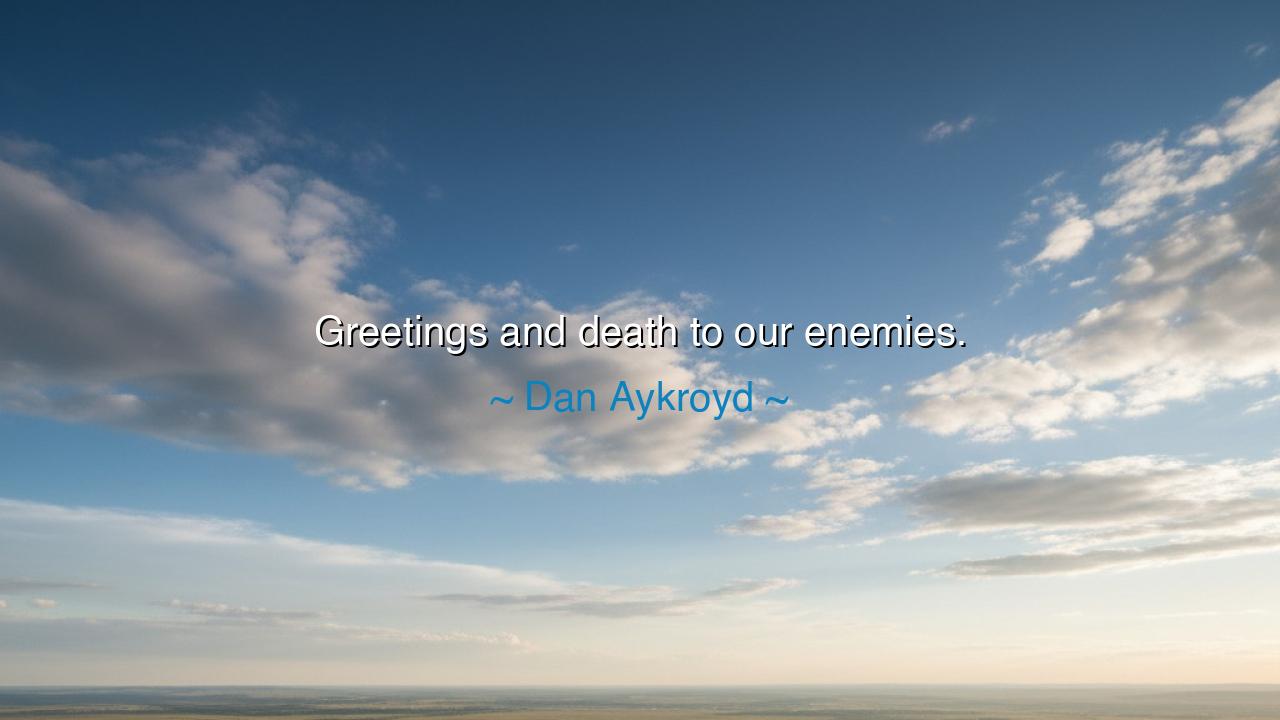
Greetings and death to our enemies.






“Greetings and death to our enemies.” – Dan Aykroyd
There are words that come forth like thunder—half jest, half prophecy. This saying, born from the tongue of Dan Aykroyd, though uttered in humor, carries the pulse of something ancient: the warrior’s heart beneath the cloak of civility. “Greetings and death to our enemies.” At first it may sound fierce, even cruel, yet in truth, it reveals a deeper current—the eternal balance between peace and strength, between the open hand and the sword held in readiness. It is a salute to life and a vow to defend it. For in greeting the world, we must also acknowledge that not all who walk in it come with goodwill.
From the dawn of man, every tribe, every nation has stood upon this edge. The Romans, when they marched forth in gleaming armor, spoke greetings to allies—but their enemies knew that peace with Rome meant either surrender or defeat. Their empire was built upon both diplomacy and might, the twin pillars of survival. Even the most peaceful of men must know how to draw the line between friend and foe, between that which nourishes life and that which seeks to destroy it. Thus, Aykroyd’s phrase, though wrapped in wit, carries the echo of an eternal truth: one cannot truly say “greetings” without also being ready, if need be, to say “farewell” to those who bring darkness.
To understand this fully, let us recall the tale of Leonidas and his three hundred Spartans. When Persia’s endless armies came to enslave the free cities of Greece, Leonidas greeted his men not with despair but with courage. “Eat well,” he said, “for tonight we dine in Hades.” His greeting was one of brotherhood and defiance, a welcome to the struggle ahead. In that moment, “greetings” and “death to our enemies” were one and the same. They saluted life by defending it with the full measure of their being. Theirs was not hatred but clarity—the understanding that some forces must be resisted, that peace without honor is no peace at all.
So too must each soul wage its own inner war. For not all enemies are of flesh and bone. Many dwell within us—fear, doubt, laziness, despair. These are the silent assassins that rob us of purpose. When Aykroyd’s phrase is turned inward, it becomes a rallying cry for the spirit: “Greetings to my higher self, and death to the weaknesses that chain me.” Each dawn, when you awaken and look upon the world, you are both the greeter and the warrior. You welcome the day, but you also prepare to confront whatever darkness seeks to follow you.
There is also wisdom in the balance of the words. “Greetings” without strength becomes naivety; “death to our enemies” without greeting becomes cruelty. Life demands both—the heart that opens and the hand that defends. The true sage knows that the purpose of strength is not destruction, but protection. To greet with confidence, one must carry the quiet assurance of a warrior’s soul. This is not a call to violence, but a reminder that peace endures only when guarded by courage.
Even in modern times, this spirit lives on. Consider Winston Churchill, who stood before his nation as bombs rained upon London. He spoke greetings to his people—words of unity, of hope—and in the same breath declared death to tyranny. His was not the language of hatred, but of preservation. He fought not because he loved war, but because he loved peace too much to let it die. So too should we live—not shrinking from conflict when justice demands it, but standing with conviction, that good may endure.
O children of the coming age, take this teaching to heart: greet the world with kindness, but let your spirit be forged in the fire of purpose. Be gentle, but not weak. Be peaceful, but not passive. Let your words carry grace, but let your actions show strength. The world respects not those who merely wish for peace, but those who protect it. So when you say “Greetings,” let it be the smile of one who stands firm—and when the hour of trial comes, may your enemies, whether within or without, find only the strength of your unyielding will.
For the true warrior of life greets all things—joy and sorrow, friend and foe alike—but bows to none but truth. And when truth stands threatened, he rises and answers as the ancients did, with calm resolve and blazing eyes: “Greetings—and death to our enemies.”






AAdministratorAdministrator
Welcome, honored guests. Please leave a comment, we will respond soon